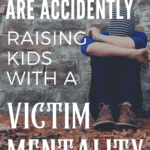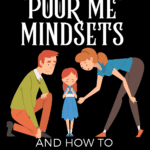These simple parenting tips will help you raise kids with a growth mindset, instead of a “poor me” outlook on life.
I stared at my feet as the lady in front of me at the checkout line was screeching at the staff, in a pitch I thought was only achievable by a pterodactyl.
I was trying to mind my own business, but I couldn’t stop watching the pulsing vein in her temple on her red face as she berated the staff.
“Why don’t you have my order ready!? How could you run out of that?! Are you trying to ruin my day!?”
“You, you, you!” she was screaming as they tried to explain what was going on and work to help her.
As painful as this was to witness, it was more gut-wrenching to realize that I have seen this type of victim or blame-game mentality many times before.
I’ve even seen it (cue palm to face) with my own children.
“Poor me” Attitude in Kids
A victim mindset is an unhealthy, self-destructive “poor me” attitude. Kids who feel this way have a hard time handling normal life circumstances, which can persist into adulthood.
When every moderately bad things happen in their lives, they have a serious problem coping.

In other words, if you don’t identify and stop victim mentality, your kid could withdraw from life experiences or grow up to be THAT person at the checkout line screaming at everyone trying to help them (which is a growing problem in the United States).
Without coping mechanisms, this can lead to real problems such as behavioral issues or the need for professional help.
It’s important to be on the lookout for the signs that your child is developing a negative attitude. Signs of a victim mentality include:
- Predicting negative events – such as “if I ride my bike, I will probably fall off and break my arm.”
- Blaming everyone else when things go wrong – such as “they made me do it.”
- Wallowing in self- pity – such as “I never get to do anything fun.”
- Overexaggerating negative events – “every single time I try to play outside it rains.”
This leads to a big question: Why do so many modern children seemingly have victim mentality?
Related: How to Bond with Each Family Member
Encourage Growth Mindset for Kids by Making these Changes
To effectively suppress and manage your kid’s victim mentality, it is important to first understand these 5 parental behaviors that feed this mindset.
1) We don’t encourage “I” statements
Recently, my happy-go-lucky 9 year old son came home from school with a face painted in sheer frustration.
With only the slightest bit of coaxing, his problem (which he was doing a poor job of hiding) exploded out of him. My typically good student shoved his social studies test in my face.
A big, fat 60% on it. His test on geographical maps rocked his world.
Surprisingly, his outburst was coming from a place of anger and blame.
Instead of saying things like “I forgot to study. I should have asked for more time to take the test” he was shouting, “The teacher didn’t explain this good. Kids in my class were being too loud. Then, the computer wasn’t working right!”

It is a good idea to teach your kid to take responsibility for their own life and actions by always speaking in I statements.
- “You” statement: You never listen to me
- “I” statement: I feel frustrated when I feel like I can’t express myself.
“I” statements force the speaker to express their own feelings, rather then placing blame on others. This ultimately leads to growth mindset in kids.
Related: 5 Ways to Hardwire Your Kid for Happiness
2) We interfere with normal cause and effect processes
We’ve all been there.
Those draining moments when you are enthralled deep in an absolutely ridiculous battle with your kid.
For example, when your kid flat-out refuses to wear a jacket in the bitter cold. Or, they don’t want to use the bathroom before going for a long car ride. Or, they refuse to eat dinner when you know they are hungry.
As parents, we try to provide our children with the utmost comfort in life; but what if that is not what they need.
Children learn more about life from natural consequences.
Like real, actual life. Bigger problems than the color of a cup.
Learn more about how to Effectively Parent with Natural Consequences.
There is no better learning opportunity for a kid than stepping back and letting them overcome difficult challenges on their own.
3) We create unrealistically ideal worlds for our kids
Your kid wanted the red cup, not the blue cup.
I KNOW it is easier to get the red cup. In fact, I have been there with the freaking red cup. I have rolled my eyes and poured that milk from the blue cup to the red cup.

However, every time we give in to these odd requests and demands, we are teaching our children that everything should and will go exactly the way they planned.
As parents, we can help kids by refusing to let them play the role of victim in these silly day to day moments.
I know it is hard, but resist the urge to switch cups or make changes from any routine simply because your child demands it. If your kid doesn’t learn to work through little things in life, how will they be able to cope with unfortunate circumstances in life.
4) We don’t teach our kids assertiveness
Many modern parents step in when our child is dealing with a conflict.
Instead, try to guide your child to be more assertive in life.
Not bossy, or mean. But assertive.

If your child approaches you with a conflict, help them find a solution and resolve it. For example, if another child takes a toy from them, guide them to kindly ask for it back.
It may not always be successful, but imbedding this confidence in your child at a young age will pay off in the long run.
Learn how to Raise Assertive Kids who Command Respect.
5) We shield our kids from negative emotions
It is said that Thomas Edison failed 1000 times before successfully inventing the the light bulb. When asked how it felt to fail 1,000 times, Edison simply said, “I didn’t fail 1,000 times. The light bulb was an invention of 1,000 steps.”
I am just saying.
Grit, or strength of will, isn’t necessarily about coming in first place or earning the big bucks. It isn’t about the outcome.
When our children do poorly on a test, lose a sporting event, or fail at anything in life, it can be hard for parents to watch.
However, this is a normal part of life. The earlier your children learn that they will have obstacles in life – and they CAN overcome them– they will be on track to growing into a resilient adult. Teach them to control their emotional reaction and control drama BY letting them work through diffucult emotions.
Related: Different Ways to Teach Kids About Mindfulness
Final Thoughts on Growth Mindset for Kids
Making these 5 small changes will hard-wire your child for a resiliency and self-love.
As parents, we can do a better job of managing our child’s behavior by actually giving them some freedom to learn from challenges. They will see the good things that come with battling obstacles.
These tips will help you transform that poor-me attitude into an I-got-this mindset.
*Reach out to your pediatrician if your child’s mindset is impacting their daily life or they are showing signs of depression or other mental health concerns*
If you found this helpful, share it! And follow us on Facebook for more simple parenting tips on raising kids who are healthy at home and strong in the world.
Also learn 5 phrases you can use to help your kid reset after a bad day.



Tamika
Monday 9th of October 2023
Thanks for the information. My son (5) definitely stuck in poor me faze if he losses a game or something he has the BIGGEST melt down calling himself stupid ect and silly me back when this started I just let him win coz it was easier but it’s gotten worse and his the same with kinder and friends ect. It’s 100% my fault and I don’t know how to change it 😡😭💔😫
How To Help Kids Grow During Tough Times - Simply Rooted Family
Wednesday 2nd of November 2022
[…] You may also like: Kids with Poor Me Mindsets Need Parents to do This […]
M
Wednesday 14th of September 2022
I though the Edison example was interesting. Being that Edison paid someone else to invent the light bulb. I think that is kinda like cheating on a math test.
5 Forbidden Phrases That We Outlawed From our Home - Simply Rooted Family
Wednesday 1st of June 2022
[…] 5 ways to prevent the “poor me” mindset […]
Bella
Tuesday 31st of May 2022
Thanks! Great article not just for me but also for my kids. Now I know why I am the way I am. 😅